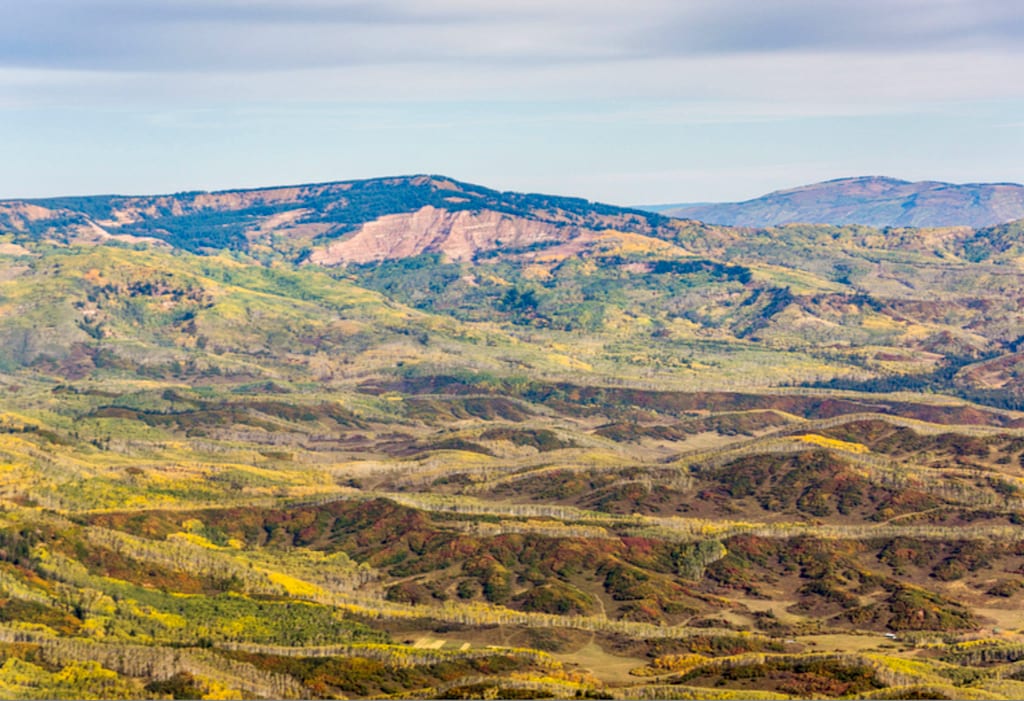Current work in wildlife, rivers, public lands, and climate
Press Releases
Federal judge stops 35,000-acre fracking plan in western Colorado
DENVER― A U.S. District Court judge vacated a federal plan that allowed fracking across 35,000 acres of Colorado’s Western Slope on May 20.
The North Fork Mancos Master Development Plan would have allowed 35 new fracking wells in the North Fork Valley and Thompson Divide areas of the Grand Mesa, Uncompahgre and Gunnison national forests that provide habitat for elk, black bear and the imperiled Canada lynx and drinking water for downstream communities. Judge Marcia K. Krieger’s order prevents new drilling and fracking in the area.
“This is a victory for the integrity of a biologically and economically diverse area,” said Melissa Hornbein, a senior attorney with the Western Environmental Law Center. “It reinforces that the federal government can’t skirt disclosing the environmental impacts of its actions. The Bureau of Land Management has to confront the dissonance between its proposal for fracking in an area already disproportionately affected by climate change and the reality that, to maintain any chance of keeping warming below the critical 1.5°C threshold, the government cannot approve any new fossil fuel projects.”
Today’s order stems from a 2021 lawsuit by conservation and climate groups challenging the U.S. Bureau of Land Management and the U.S. Forest Service for failing to analyze potential water and climate pollution, or plan alternatives that would prevent such harm. The plan would have caused about 52 million tons of greenhouse gas pollution, equivalent to the annual pollution from a dozen coal-fired power plants.
“In this case, BLM acknowledged deficiencies in its analysis. Based on the court’s ruling, the agency must start over if they’re going to approve fossil fuel development in the area,” said Peter Hart, an attorney with Wilderness Workshop. “This will give BLM a chance to reconsider whether this is the right decision in the first place, and to contemplate alternatives that don’t destroy the headwaters of the North Fork, pristine roadless areas and our climate.”
Colorado’s Western Slope is already suffering from severe warming. The Washington Post featured the area as the largest “climate hot spot” in the lower 48 states, where temperatures have risen more than 2 degrees Celsius. The temperature rise is reducing snowpack and drying Colorado River flows that support endangered fish, agriculture and 40 million downstream water users.
“Today’s ruling is an important victory for the North Fork Valley community because it ensures government accountability and protects our vital public lands, water resources and climate from misguided oil and gas development plans,” said Natasha Léger, executive director, Citizens for a Healthy Community. “The government’s concession that its analysis of the project was inadequate would not have occurred without this citizen-led lawsuit.”
“We’re thrilled that today’s decision protects the spectacular public lands, wildlife and waters of the Upper North Fork,” said Matt Reed, public lands director for Gunnison County-based High Country Conservation Advocates. “Furthermore, this ill-conceived project would have impacted critical headwaters that sustain a significant organic agriculture industry immediately downstream in Delta County, whose farms are an important source of produce for Gunnison County individuals and businesses.”
Several analyses show that climate pollution from the world’s already-producing fossil fuel developments, if fully developed, would push warming past 1.5 degrees Celsius, and that avoiding such warming requires ending new investment in fossil fuel projects and phasing out production to keep as much as 40% of developed fields in the ground.
“The judge’s order has spared forests, creeks and wildlife from fracking industrialization and prevented dangerous climate pollution along Colorado’s spectacular Western slope,” said Taylor McKinnon at the Center for Biological Diversity. “Now It’s time for President Biden to keep his promise and stop all new oil and gas expansion on our public lands and waters. His urgent action can help save the Colorado River basin, and the planet, for future generations.”
Thousands of organizations and communities from across the United States have called on President Biden to halt federal fossil fuel expansion and phase out production consistent with limiting global warming to 1.5 degrees Celsius.
“Climate action starts in places like Colorado’s North Fork Valley, where it’s absolutely vital to keep fossil fuels in the ground and protect the region’s clean air and water, public lands and wild places,” said Jeremy Nichols, climate and energy program director for WildEarth Guardians. “This lawsuit win is a critical victory for the climate and for western Colorado’s North Fork.”
Plaintiffs Citizens for a Healthy Community, Wilderness Workshop, High Country Conservation Advocates, Center for Biological Diversity and WildEarth Guardians are represented in this litigation by Western Environmental Law Center.
Background: Fossil fuel production on public lands causes about a quarter of U.S. greenhouse gas pollution. Peer-reviewed science estimates that a nationwide fossil fuel leasing ban on federal lands and oceans would reduce carbon emissions by 280 million tons per year, ranking it among the most ambitious federal climate-policy proposals.
Oil, gas and coal extraction uses mines, well pads, gas lines, roads and other infrastructure that destroy habitat for wildlife, including threatened and endangered species. Oil spills and other harms from offshore drilling have inflicted immense damage to ocean wildlife and coastal communities. Fracking and mining also pollute watersheds and waterways that provide drinking water to millions of people.
Federal fossil fuels that have not been leased to industry contain up to 450 billion tons of potential climate pollution; those already leased to industry contain up to 43 billion tons. Pollution from the world’s already producing oil and gas fields, if fully developed, would push global warming well past 1.5 degrees Celsius.

The North Fork Valley in Colorado. Photo by EcoFlight.